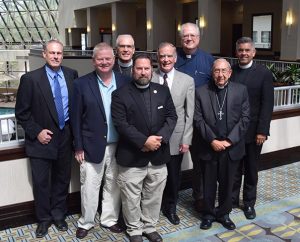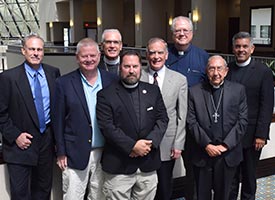As representatives of The Lutheran Church—Missouri Synod and the North American Lutheran Church (NALC) continued their ongoing consultations Sept. 9-10 in St. Louis, leaders of both church bodies agreed that despite some differences, their discussions about common commitments to the authority of Scripture and other matters of agreement are invaluable.

Key leaders of the two church bodies have been meeting together — usually twice a year — since late 2011, initially at the invitation of LCMS President Rev. Dr. Matthew C. Harrison. Also involved in the discussions are leaders of Lutheran Church—Canada (LCC). Harrison and LCC leaders were not available for the September meeting.
A rapidly growing church body, the NALC has about 140,000 members in the United States and Canada. It was formed in 2010 by confessional Lutherans who opposed the Evangelical Lutheran Church in America’s decisions allowing same-sex marriage and ordination of homosexual pastors.
At this most recent consultation, the representatives continued their look at the authority of Holy Scripture — foundational to both church bodies’ stances on matters such as marriage as only the union of one man and one woman, as well as the evils of abortion. Representatives also noted that both churches also share concern that religious liberty is at risk in the face of court rulings and legislative action contrary to their confessional stances. The representatives also discussed persecution of Christians worldwide.
For their discussion on biblical authority — which also will be on the agenda for their next consultation March 16-17 in Bradenton, Fla. — the representatives looked at a 1973 report of the LCMS Commission on Theology and Church Relations titled “A comparative study of varying contemporary approaches to biblical interpretation.”
They also reported on other recent developments within their two church bodies.
After the September joint consultation, LCMS Director of Church Relations Rev. Dr. Albert Collver III told Reporter that although “one of the purposes of the dialogue is to see where we have differences and similarities, what we’re finding in most cases is that we have much in common, for which we can continue to rejoice.
“We look to continue talking and to mutually encourage one another to make a bold confession in the world and in our country,” Collver said.
NALC Bishop Rev. John Bradosky of Bradenton agrees.
“We were and continue to be grateful to have another Lutheran church body with whom we can share in this journey, facing the unique challenges of a faithful witness in our culture,” Bradosky said. “Our conversations have been candid, honest, void of any agendas, focused on our faith in Christ and our commitment to boldly proclaim the Gospel. … It is our fervent prayer that working together will strengthen our witness to the world.”
Of the consultation’s current focus on biblical authority, Bradosky said, “In the course of reviewing Missouri Synod theological documents regarding Holy Scripture and faithful ways to interpret the Bible, we discovered that we share so many common understandings that the differences seem minor and a matter of word choices to express the same truth.”
Bradosky told Reporter that as the NALC’s Commission on Theology and Doctrine works to develop a “teaching statement on Holy Scripture, we look forward to utilizing both these documents and our conversations as the basis for our statement’s formation and content.
“While we continue our conversations knowing there are many more issues and concerns to be addressed,” Bradosky concluded, “we have confidence in the power and work of the Holy Spirit to draw us ever closer to Christ and one another.”
“The discussions between the LCMS and NALC leaders over the past three years have been extremely cordial, theologically substantive and quite productive,” said the Rev. Dr. Joel Lehenbauer, executive director of the LCMS Commission on Theology and Church Relations. He said that is especially true “in terms of identifying issues of agreement and disagreement, topics that need further attention and discussion and critical society and cultural issues on which we can speak together.”
The Rev. Dr. David Wendel, the NALC’s assistant to the bishop for Ministry and Ecumenism, said that this most recent meeting of the consultation further confirmed for him that “the greatest value of these consultations is the opportunity to share deeply from our biblical and confessional commitments as brothers in Christ, facing real challenges in our day and context.”
Wendel said he finds the tone of these discussions “much different … from many previous inter-Lutheran conversations because we no longer are engaged with one another as a form of academic exercise, but meet together fully aware of the increasing secularization of our culture, the decline of our churches [in membership] and the real persecution of Christians in our world. These are not ‘ivory-tower’ conversations, but more like discussions of battle strategy in the bunker, while under spiritual attack from the enemy.
“We give thanks to God for our brothers and sisters in the LCMS,” Wendel said, “for their willingness to stand for the unchanging truth and authority of God’s Word. We give thanks that we are not standing alone, but with all the faithful in The Lutheran Church—Missouri Synod.”
Others representing the LCMS at the recent consultation/dialogue were CTCR Associate Executive Director Rev. Larry Vogel and the Rev. John Pless, assistant professor of Pastoral Ministry and Missions and director of Field Education at Concordia Theological Seminary, Fort Wayne, Ind.
Also participating for the NALC were Bishop Emeritus Rev. Paull Spring and General Secretary Rev. Mark Chavez.
Posted Sept. 23, 2015
